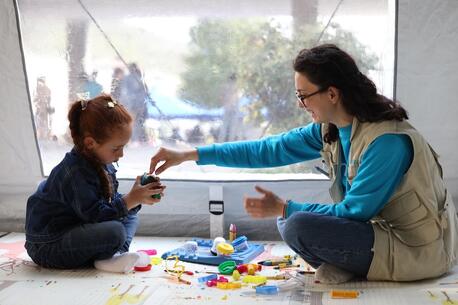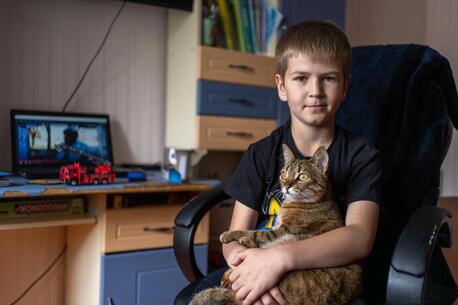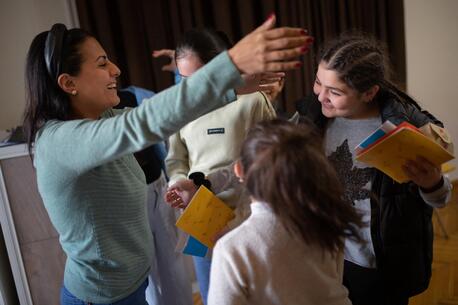
UNICEF in Armenia: Better Together, Today and Tomorrow
In the midst of uncertainty in an emergency, UNICEF’s mental health and psychosocial support programs in Armenia are fostering long-term trust and resilience around a crucial element: community.
Last year, an escalation of hostilities between Armenia and Azerbaijan led to a large-scale influx of refugees to Armenia. By late September 2023, more than 115,000 ethnic Armenians, including about 36,000 children, had fled into Armenia, joining around 26,700 people who were displaced during the 2020 conflict.
Now, about 1 out of every 16 children in Armenia is a refugee. Basic services are overstretched, with many host communities already experiencing limited access to services. Long periods of uncertainty and repeated military escalations have taken a toll on the mental well-being of refugee children and their families, and across host communities.
In a room three subway stops away from the heart of Yerevan, Armenia's capital and largest city, UNICEF and implementing partner staff including youth workers, peer support volunteers, psychologists and social workers gathered recently with caregivers to share their experience.
From the start of the emergency response, staff shared that mental well-being needed to be addressed along with a number of essential need gaps such as housing and health checks. When more than 100,000 refugees arrived through the city of Goris, home to 20,000 people, with a high need of support to cope with the grief and loss of displacement, many felt overwhelmed. It felt like there was not enough time to support everyone, one mental health and psychosocial services (MHPSS) worker commented.
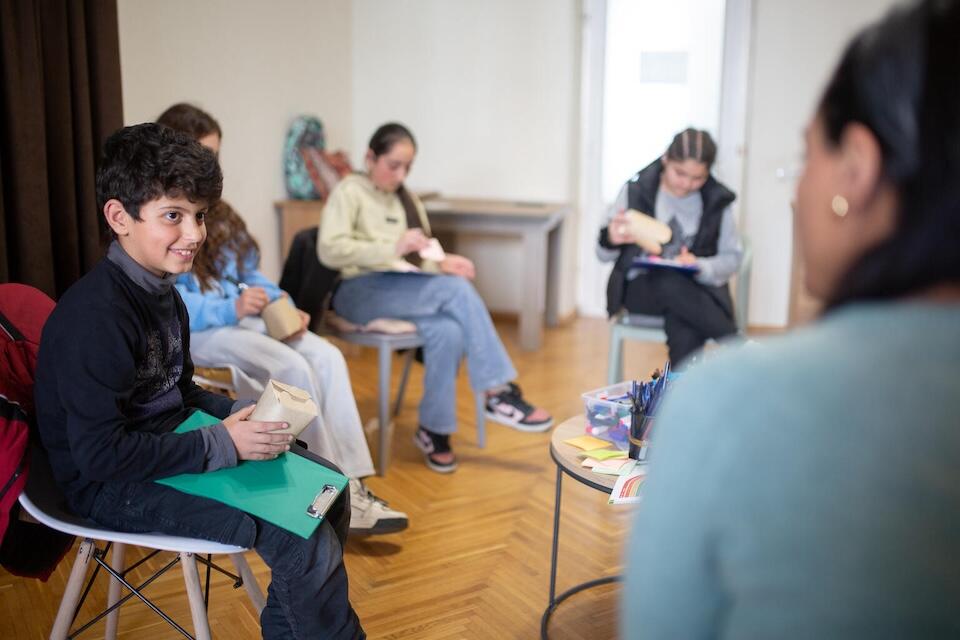
Challenging stigma and misperceptions surrounding mental health care
On top of the vast needs, when workers were able to meet with people there was often apprehension and resistance to talking about what had just happened, especially with psychologists.
UNICEF Armenia staff shared that increasing access to services alone would not be enough. Increased demand for services was needed as well. Despite significant efforts, UNICEF and partners still face many challenges when approaching communities for mental health support in Armenia. It has been difficult for community members to open up about their experiences. That is why a partner staff member shared with a sympathetic nod that when they knocked on the front door of a temporary housing unit, the family's teenage daughter answered the door and closed it immediately when the worker introduced themself as a psychologist.
As staff members shared their experiences and moments of helplessness, a mix of hands on shoulders, offers of tissues and understanding smiles made their way around the room.
With an overstretched work force that had not previously provided this level of support, let alone in the context of an emergency, how would it be possible to fully reach the incoming refugee population and the host communities that needed support? And how could staff themselves continue to support and cope with the impact of seeing their fellow Armenians suffering?
At one point, one of the MHPSS worker members chimed in: UNICEF’s holistic implementation made a difference. It instilled confidence and made the social workers feel like they are not alone.
UNICEF knows that multiple avenues are needed to effectively reach children and caregivers in need and provided the support needed to link these efforts together. With multiple modalities available, people would be able to have more options around how and when they were ready for support.
UNICEF’s response within the emergency context builds on years of experience as it has worked with children and caregivers in Armenia since 1994. For example, prior to the current refugee inflow, UNICEF was aware that parenting messaging not only resonated with families in Armenia but also created increased demand for additional assistance. To support these needs, UNICEF Armenia developed Babycef, an online resource hub for evidence-based parenting guidance and "Parents Meeting," a TV program providing valuable insights into child health and parenting techniques for Armenian parents, with a focus on empowering parents to navigate the complexities of raising healthy and happy children. Thus, when emergency MHPSS needs surfaced in 2020 and again in 2023, UNICEF and partners knew a community- and family-based approach would be key.
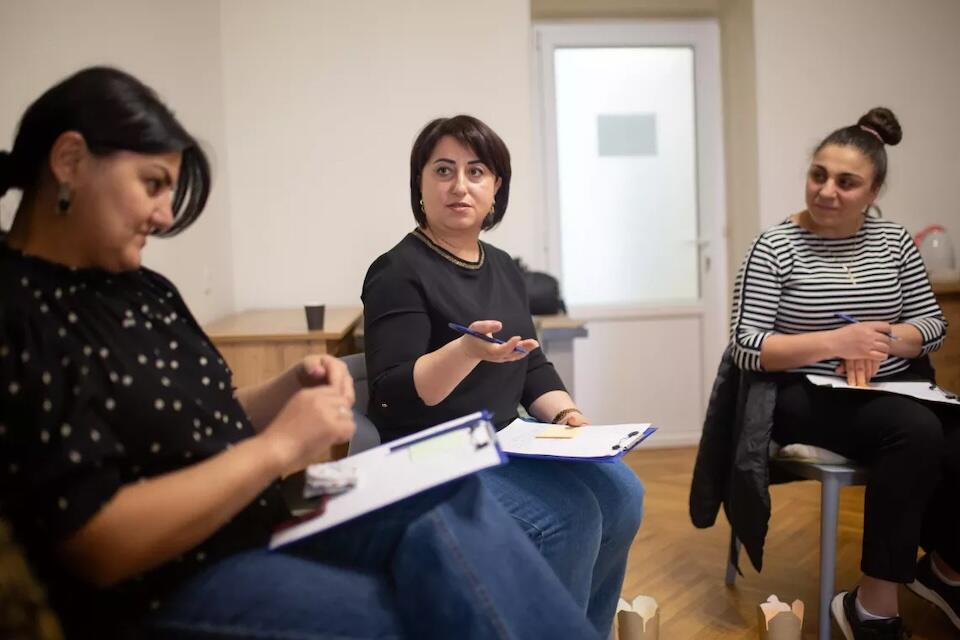
Strengthening impact: through the community, for the community
UNICEF’s work in MHPSS is structured across three main interventions which are critical to identify and provide children and community members with the right support and also proactively foster healthy community behaviors, ensuring cases do not increase in number or severity. Interventions include:
- Promotion interventions: increase protective factors, including healthy behaviors and skills in a community
- Prevention interventions: utilized to stop mental health and psychosocial problems from developing, getting worse or reoccurring
- Treatment interventions: implemented to address mental health conditions through personalized care delivered to individuals or groups.
By implementing this structure for interventions, MHPSS workers were also able to provide more quality interventions, due to a more defined and decreased case load. With UNICEF’s support, refugee and host community children, adolescents and caregivers began accessing quality and effective MHPSS services and information on the interventions wherever children and families were.
For example, interventions were linked through other social services or in school by training social workers and teachers on well-being support and referral pathways. In health care settings, support could be provided for more specialized support as needed. In community spaces, and even in the digital space, there is also an opportunity to reduce the stigma and promote communities’ willingness to reach out for support.
As staff reached out to communities, it was also key to further build trust with and across communities. For example, outreach activities through a food festival helped people in refugee and host communities know each other more and develop ties. Staff saw adolescents and adults strengthen new connections among one another.
Globally, UNICEF recognizes the value of these connections and elevates the value of community-based interventions to ensure successful and sustainable programs.
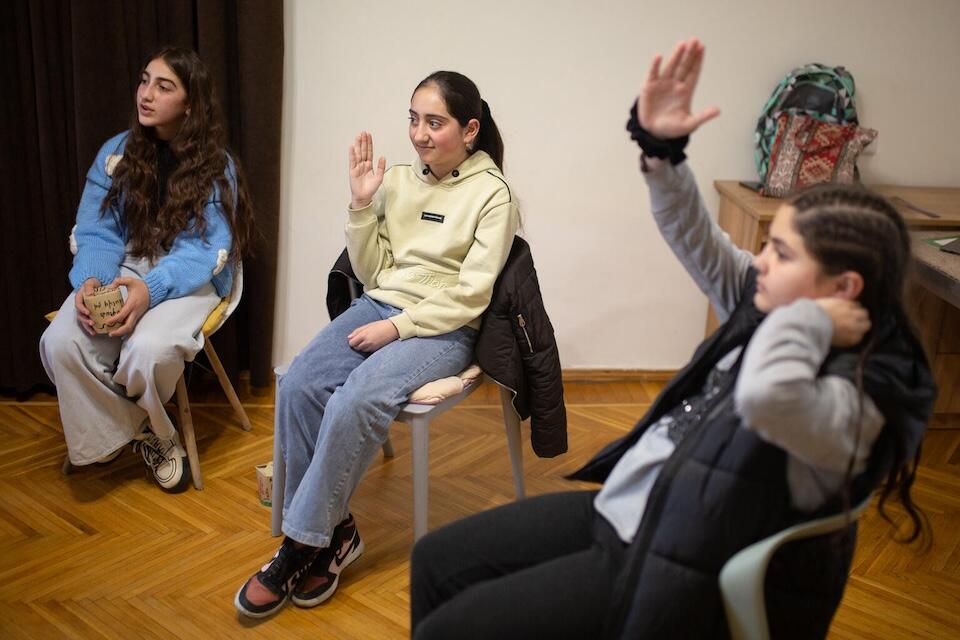
A key ripple effect helps connect more parents and children in need with support services
In Armenia, a successful program required the creation of parent and adolescent networks in rural and border communities to strengthen these connections, while equipping participating community with non-specialized training on well-being support and basics of referral mechanisms. As cases continue to be identified earlier before less intensive support may be needed, UNICEF also continues to build capacities of non-specialist workers, including youth workers, community workers, and peer support volunteers (PSVs), to better support adolescents and young people.
Through these efforts, adolescents and parents also started to see a compounding effect as they began to promote mental well-being in their own social circles by leaning on the same mechanisms and networks they were using to help others. Staff shared that the reference systems created a key ripple effect to help community members identify people in need.
A mother in the group attested to this impact. She recalled an online session helped her better manage her emotions back in 2020 and that she enjoyed tuning in without headphones so her family could also listen in. She said this approach paved the way for better conversations today as her husband or child refer to issues they had also heard and work together to apply lessons learned.
Another mother shared how she was able to better understand how the uncertainty of displacement impacted her child’s well-being and how she would become anxious when she left for school. With this in mind, the mother would kiss the palm of her child’s hand and close it. Once in school, whenever anxiety crept up, the child would look to her palm for grounding and consistency.
UNICEF’s training for teachers also ensured there was support in schools. Teachers are being equipped around well-being support and referral mechanisms. Staff also shared that they saw teachers learn dialect differences to better understand newly arrived children and help integrate them in lessons.
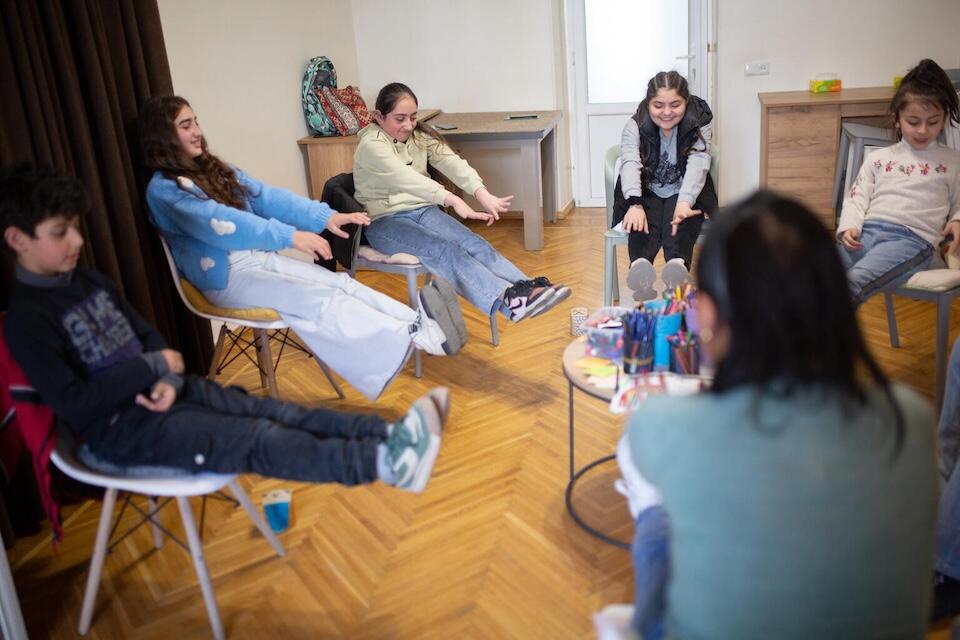
UNICEF and partners reached more than 15,000 children and caregivers in Armenia with MHPSS support in the first quarter of 2024
By increasing capacity at a community level, the MHPSS case landscape is changing. While needs are still present, staff noted that they have started seeing shifts in individual therapy, with conversations moving more from restoring to preventing increased trauma. At the beginning, the momentum was not there, an MHPSS worker noted. Now, they are seeing more emotions coming out, along with increased rapport and understanding across communities.
That is why, one staff member said, they will continue working. In the first quarter of 2024 alone, UNICEF and partners have reached more than 24,800 children and caregivers accessing mental health and psychosocial support. With the support of partners, UNICEF will continue to reach affected children and their families and strengthen national system capacities to ensure the emergency response is linked with long-term mental health support for every child in Armenia.
While challenges remain, when asked about the future, volunteers, workers and parents in the room shared their thoughts with one consistent undertone: hope.
UNICEF works around the world to ensure that every child can grow up safe and healthy. Your contribution will make a difference. Please donate.
HOW TO HELP
There are many ways to make a difference
War, famine, poverty, natural disasters — threats to the world's children keep coming. But UNICEF won't stop working to keep children healthy and safe.
UNICEF works in over 190 countries and territories — more places than any other children's organization. UNICEF has the world's largest humanitarian warehouse and, when disaster strikes, can get supplies almost anywhere within 72 hours. Constantly innovating, always advocating for a better world for children, UNICEF works to ensure that every child can grow up healthy, educated, protected and respected.
Would you like to help give all children the opportunity to reach their full potential? There are many ways to get involved.




